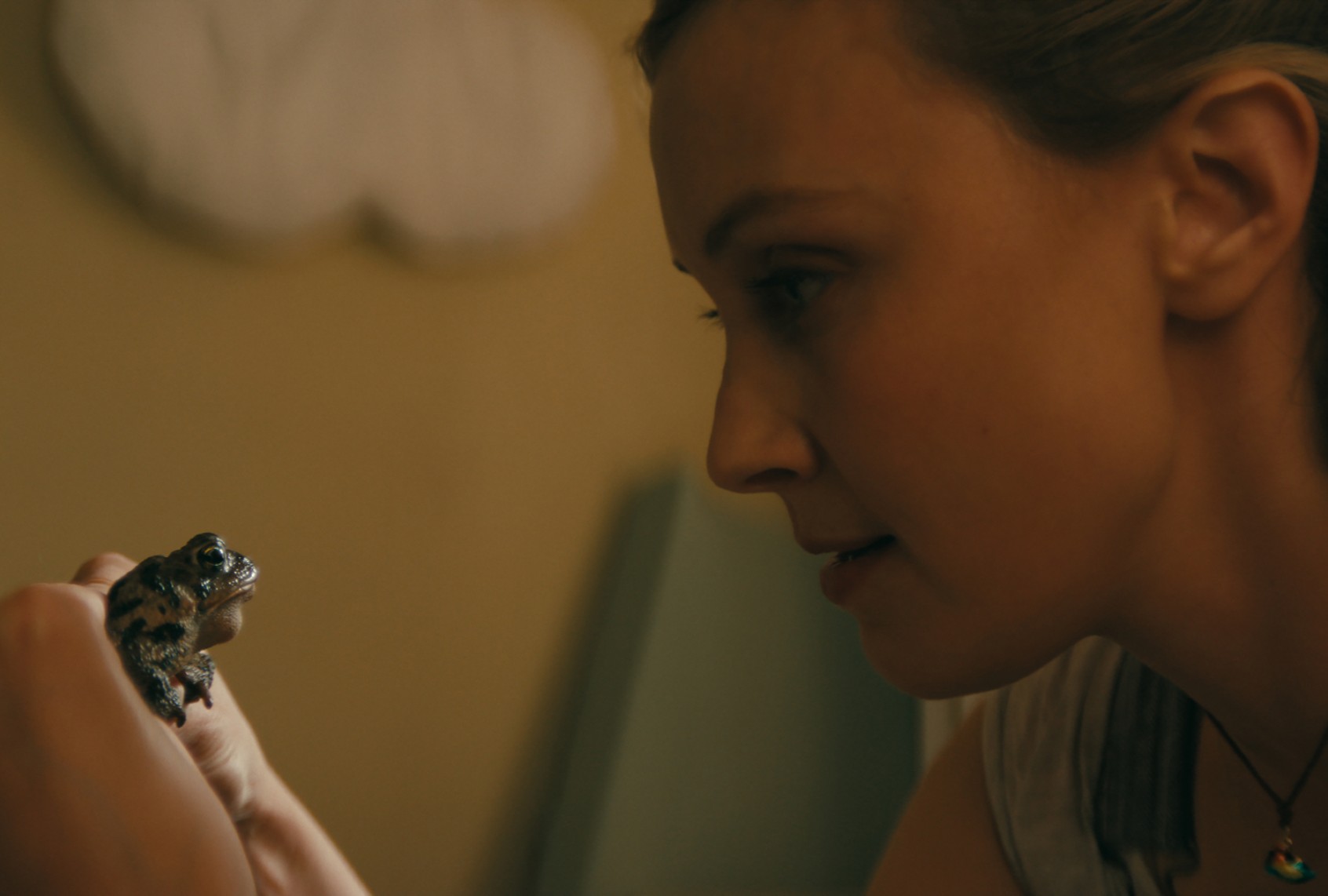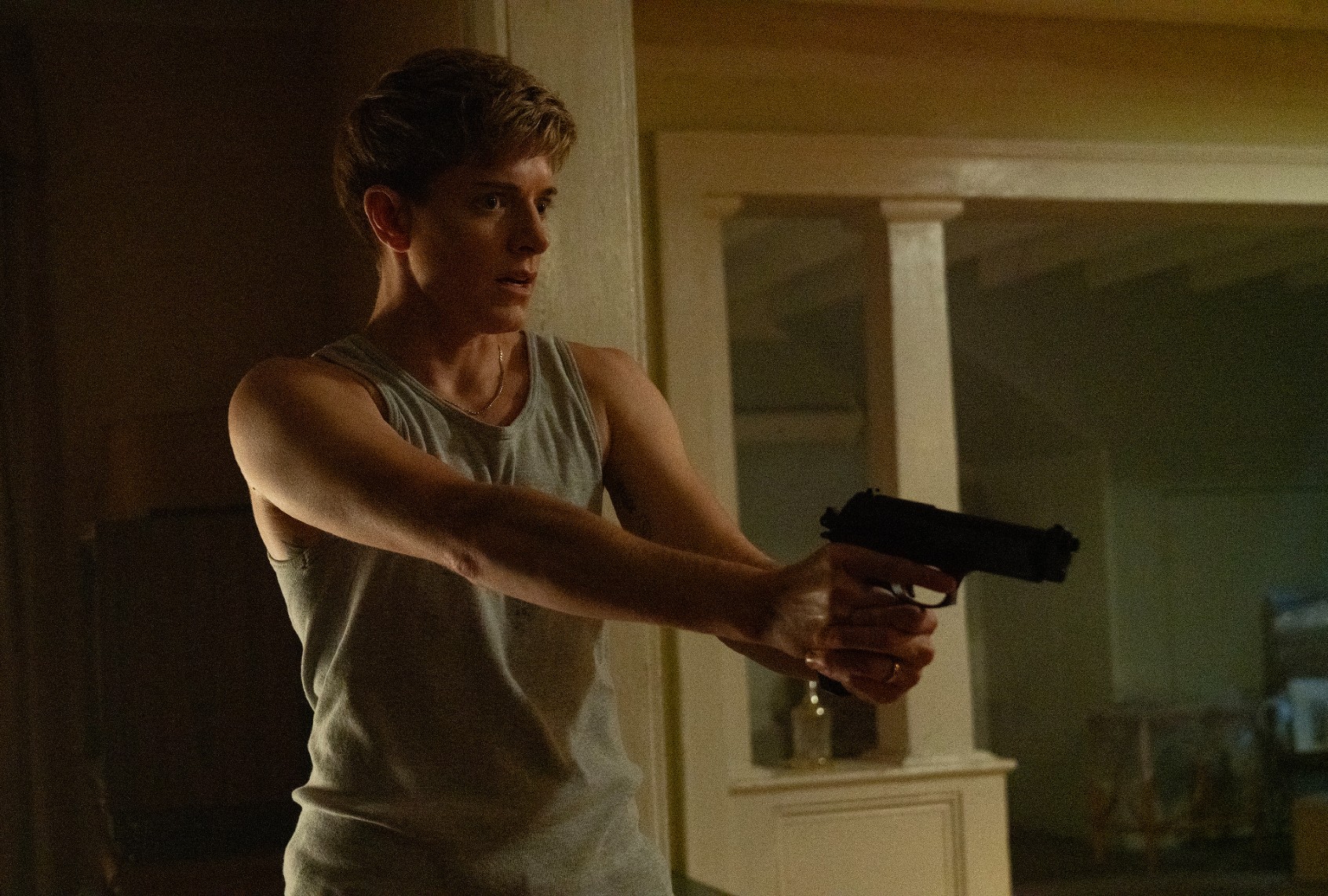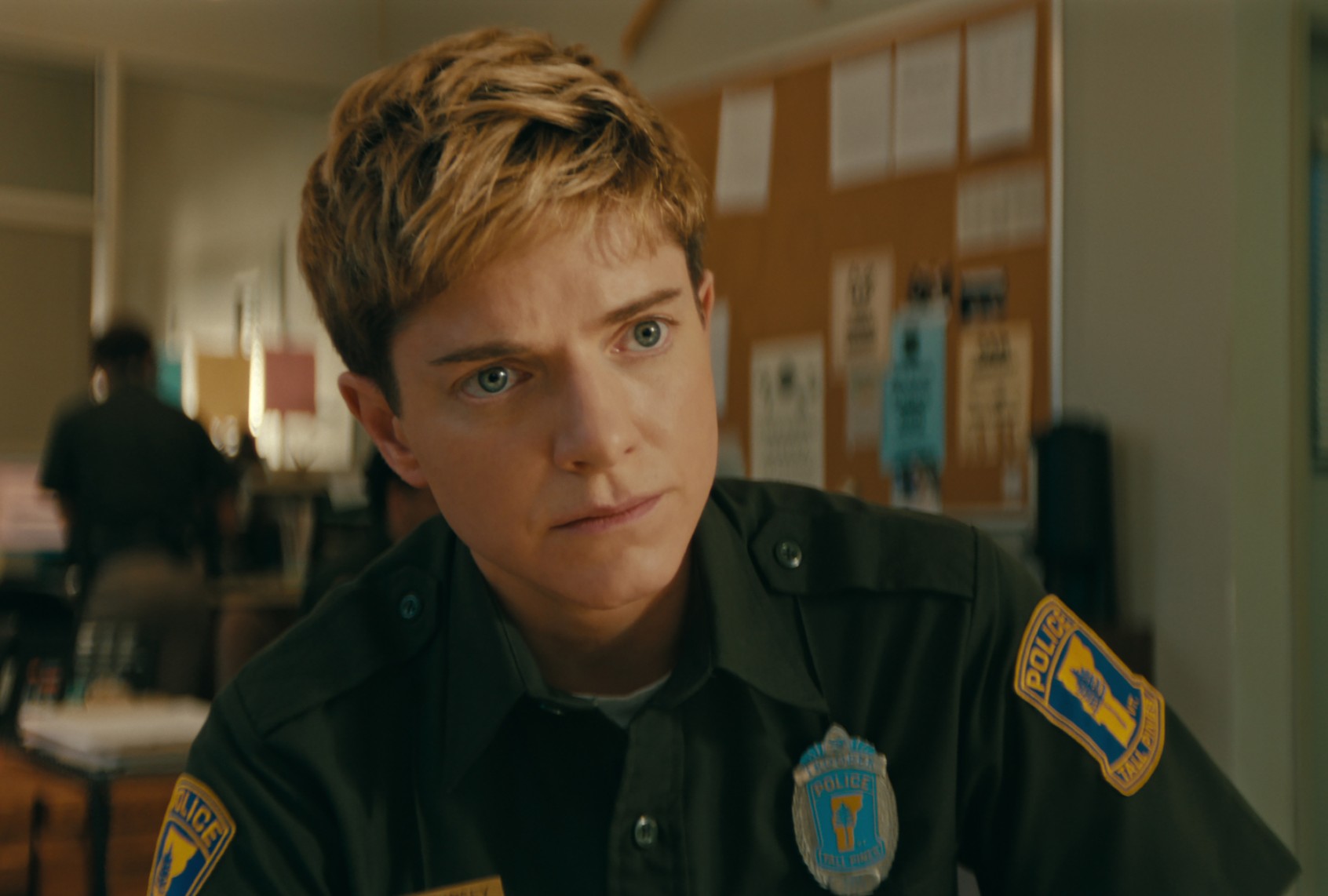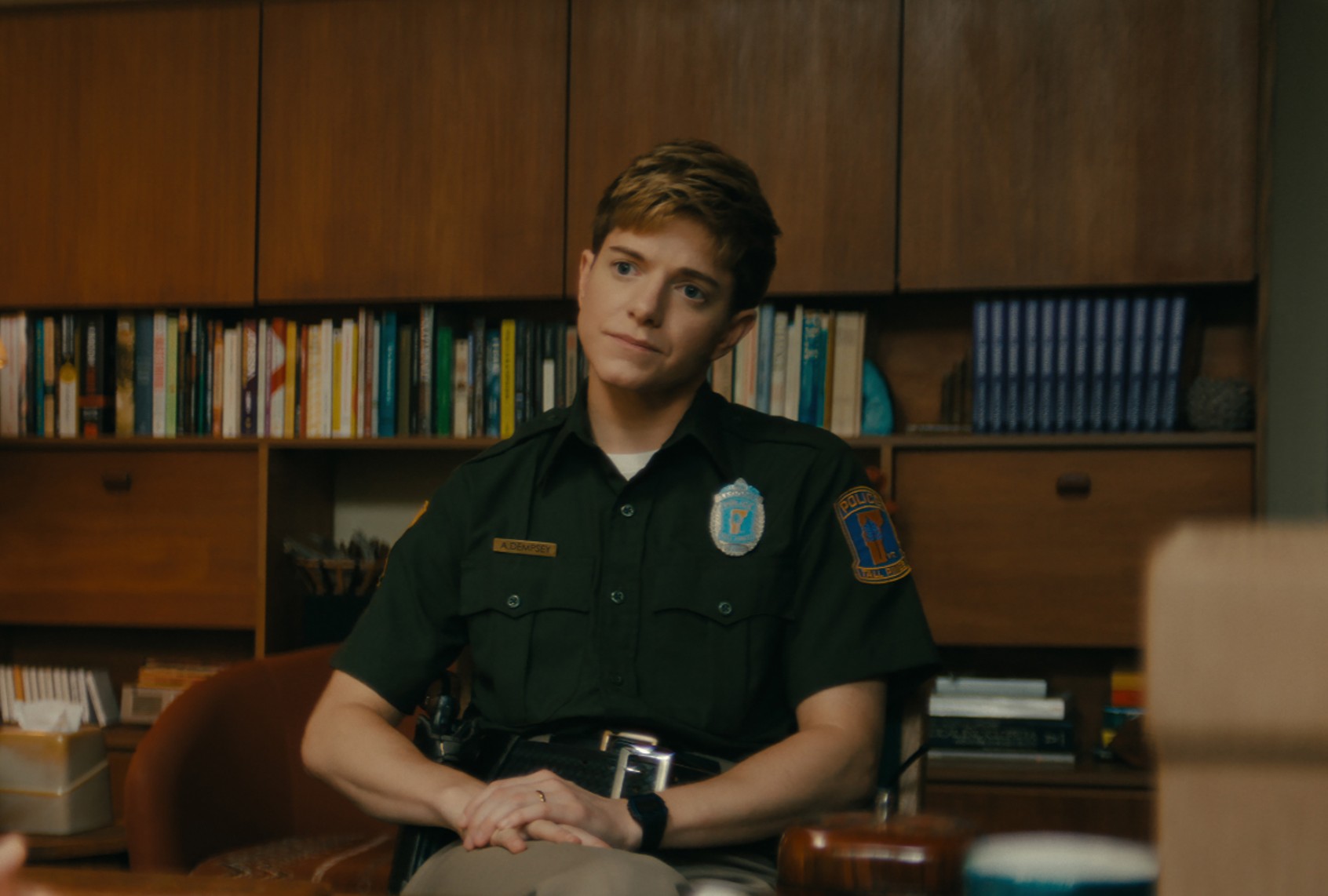It just so happens that, concurrent to my watching all eight episodes of Netflix‘s new miniseries, “Wayward,” twice — back to back, and with obsessive interest — I’ve been reading Melissa Broder’s 2018 novel, “The Pisces,” about a lady finding herself in love with a man who is half fish. Perfect, in that, halfway through my first watch of “Wayward,” I stopped to question if the troubled youths being held in the therapeutic school where much of the show’s action takes place were being turned into frogs.
In the thriller series, created by and starring Mae Martin in the role of Alex Dempsey, a trans man who relocates to seemingly idyllic Tall Pines, Vermont, with his pregnant wife, Laura (Sarah Gadon), after a teased-out bad run of things in Detroit, the croak of toads is as much of a soundtrack as the mix of stoner classics from the ’60s and ’70s, comingled with peak aughts hits to align with the show’s 2003 setting.
What if being yourself is no good, if you’re broken inside? And being forced into something else — either by your own doing, or by a woo-woo cultish trike-rider like Evelyn Wade (Toni Collette), head of Tall Pines Academy, is even worse?
Toads are simply everywhere. Underfoot at every turn. They’re even the town’s mascot, and eagle-eyed viewers can spot imagery of them in almost every episode. All of which led me to incorrectly presume that the parents of the wayward teens being therapised in the mysterious town — home to no local children — willingly signed them over to Tall Pines Academy to be turned into amphibians because a sentient toad child would be easier to manage than one who does drugs, gets bad grades, or has sex in cars parked on Suburban residential streets. But even though this is an anything-goes type of show, the themes of it — control, manipulation, transformation — felt deeper than something that would go to a place of rananthrope, until you factor in the common role that frogs take on in fairy tales: Slimy, warty things, living in wet darkness and good for nothing but eating flies and peeing on people’s hands until they’re kissed and turn into a prince, ready and capable to be a protector, plucked from the muck and made anew.
Tadpoles become toads, and, in tales such as this one, metaphorical toads can be — whether through will, chance, or wishes — transformed into something else. But what if the previous and the thing to follow are both better off left in the bucket? What if being yourself is no good, if you’re broken inside? And being forced into something else — either by your own doing, or by a woo-woo cultish trike-rider like Evelyn Wade (Toni Collette), head of Tall Pines Academy, is even worse?

(Courtesy of Netflix) Sarah Gadon as Laura Redman in “Wayward”
When you’re working on your identity and how you occupy space, finding yourself in a position of authority pushes you to weigh the difference between who you are and who you want to be. Alex, whom we come to find has a history of violence, grapples with this in many ways. In the early part of our introduction to his character, preparing for his first day at work as Tall Pines’ new deputy, he makes the first of a series of self-deprecating jokes about his small build — less than a non-issue for horny Mae Martin fans, flooding social media with hubba hubba posts in the wake of the series’ release last week.
When you’re working on your identity and how you occupy space, finding yourself in a position of authority pushes you to weigh the difference between who you are and who you want to be.
Wearing a uniform two sizes too big and introduced to the rest of the department by a chief who makes sure to hit the “him” in that introduction, Alex works at taking on the manly duties in his marriage to Laura (going into dark, spooky basements to investigate what makes them spooky, etc.) although Laura always seems to have the upper hand. Topping from the bottom, as it were. She’s also one of the first to directly poke at Alex’s masculine identity.

(Courtesy of Netflix) Toni Collette as Evelyn Wade and Joshua Close as Duck in “Wayward”
“Still no stubble,” Laura says to Alex as they lie in bed together one night. “I know. Maybe I should up my dose,” he says, rubbing his baby-smooth face. “I bet you never imagined the father of your kid looking like Macaulay Culkin in ‘Home Alone.’”
But being a trans man in an ill-fitting uniform is another non-issue. The issue is what the uniform represents, and the poorly constrained rage within the man wearing it that it gives agency to seep out. Which Evelyn — Laura’s former teacher —needles into in a later episode.
“It must be strange to search for yourself your whole life, only to realize you are a violent cliché,” Evelyn tells Alex after he’s been nabbed by his townie partner on the force, Dwayne (Brandon Jay McLaren), so that she can perform the therapeutic school’s final brainwashing maneuver on him. Which is, of course, called being “leaped.”

(Michael Gibson/Netflix) Mae Martin as Alex Dempsey in “Wayward”
“How many people do you have to hurt before self-defense feels like a hollow refrain?” Evelyn says to Alex, furthering that he doesn’t really love his wife, only the idea of her, because it makes him feel like a real man. Throughout the show’s eight episodes, we learn that not only did Alex bring with him to Tall Pines a reputation for using “excessive force” on the job, but we see him kill “in self-defense” two other people and nearly beat a third to death with his bare fists.
“He’s definitely someone who’s seduced by and yearning for that kind of heteronormative hypermasculinity,” Martin said about their character in a recent interview with Deadline. And in a different interview, with Tudum, they describe Alex as making “some bad choices and some good choices,” which could also describe the rest of the show’s characters — Evelyn included.
Start your day with essential news from Salon.
Sign up for our free morning newsletter, Crash Course.
A graduate of Tall Pines Academy chats with Alex at the town’s farmer’s market in one episode, answering the question of whether or not Evelyn tried to therapy the gay out of him by saying, no, she helped him be more his true self. Other graduates of the academy, who stay on at the school to help oversee the latest batch of students, exhibit being their “true selves” by taking on happy little animal names, which do not, by any means, align with the violence they inflict on the kids they claim to be helping.
Are you a pigeon? A rabbit? A duck? A mule? Hiding behind a fuzzy name while a’pickin’ and a’thumpin’ and a’quackin’ and a’kickin’ because you’re “in charge?” Or are you a toad? Unaware and uncaring that there’s an option to be anything else, and just swimming, until the thought is introduced in your mind that that’s somehow wrong to do?

(Courtesy of Netflix) Sarah Gadon as Laura Redman and Mae Martin as Alex Dempsey in “Wayward”
“Where does your fear live? In the patterns you construct for yourself,” Evelyn’s voice is heard saying over the loudspeaker at Tall Pines Academy in one scene. And it’s never alluded to that she doesn’t fully believe her own dogma. A graduate of her teachings, a fisty man who goes by the name of Duck, elsewhere tells a student named Leila (Alyvia Alyn Lind) that before he came to Tall Pines, he hadn’t left his parents’ basement in 18 months, but now he feels so strong and virile.
Oftentimes, when people tell you to “just be yourself,” they mean they want you to be who they think you are. Everyone in Tall Pines, past and present, who has been mind-dunked by Evelyn may have come in believing they knew who they were, but now, they’re all just many different facets of her, all under the shared delusion that they’re doing something good, both for themselves and for others. And that they have the authority to do that. Alex’s wife included.
Oftentimes, when people tell you to “just be yourself,” they mean they want you to be who they think you are.
But Alex, who wears the costume of authority as a police officer, not because he thinks he’s good, but because he wants to be yet knows he’s not, rolls over the actual societal control he had both as a man and as a deputy by choosing to stay in Tall Pines and support Laura’s endeavor to start an intentional community of her own, because it best fits the picture of his life he’s painted for himself.

(Courtesy of Netflix) Mae Martin as Alex Dempsey in “Wayward”
In Broder’s “The Pisces,” mentioned at the top of this, the book’s main character, Lucy, bemoans an awkward fling with a much younger guy in the lobby bathroom of a fancy hotel, pre-merman, feeling as though she had given him her power. Alex gives away his power to Laura time and time again in “Wayward,” but we see it most clearly in the series’ finale.
In the last scene, we’re shown a version of an ending where Alex runs to meet the only student to truly escape Tall Pines, Abbie (Sydney Topliffe), and Toast, his abandoned dog, lugging his newborn baby. As they flee town together, Abbie says, “I knew you’d do the right thing. You’ll always protect us because that’s what you are, a protector.”
“A protector,” he mutters to himself in unison.
But then we flash to reality, with Alex closing the door of his house, returning to Laura.
He knows exactly who he is.
Read more
about this topic


